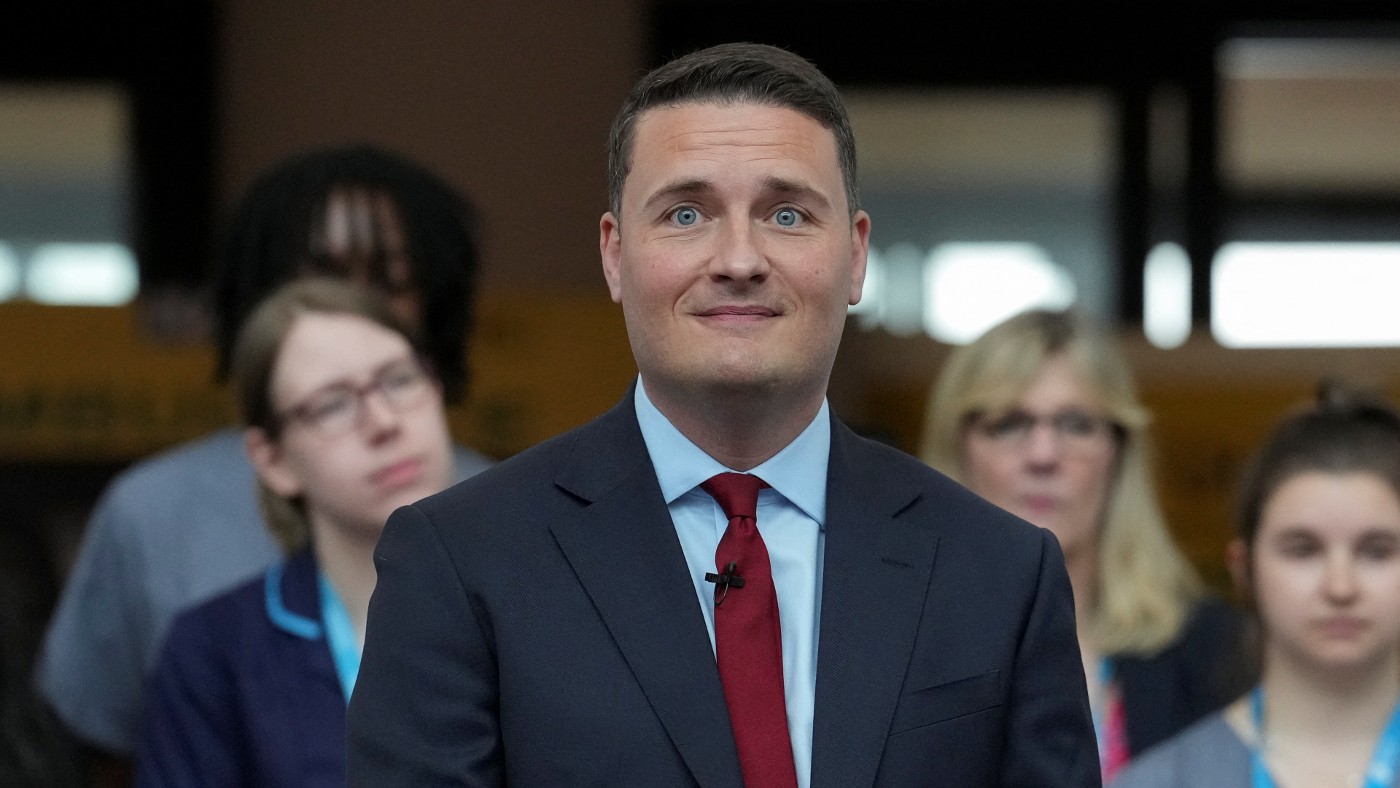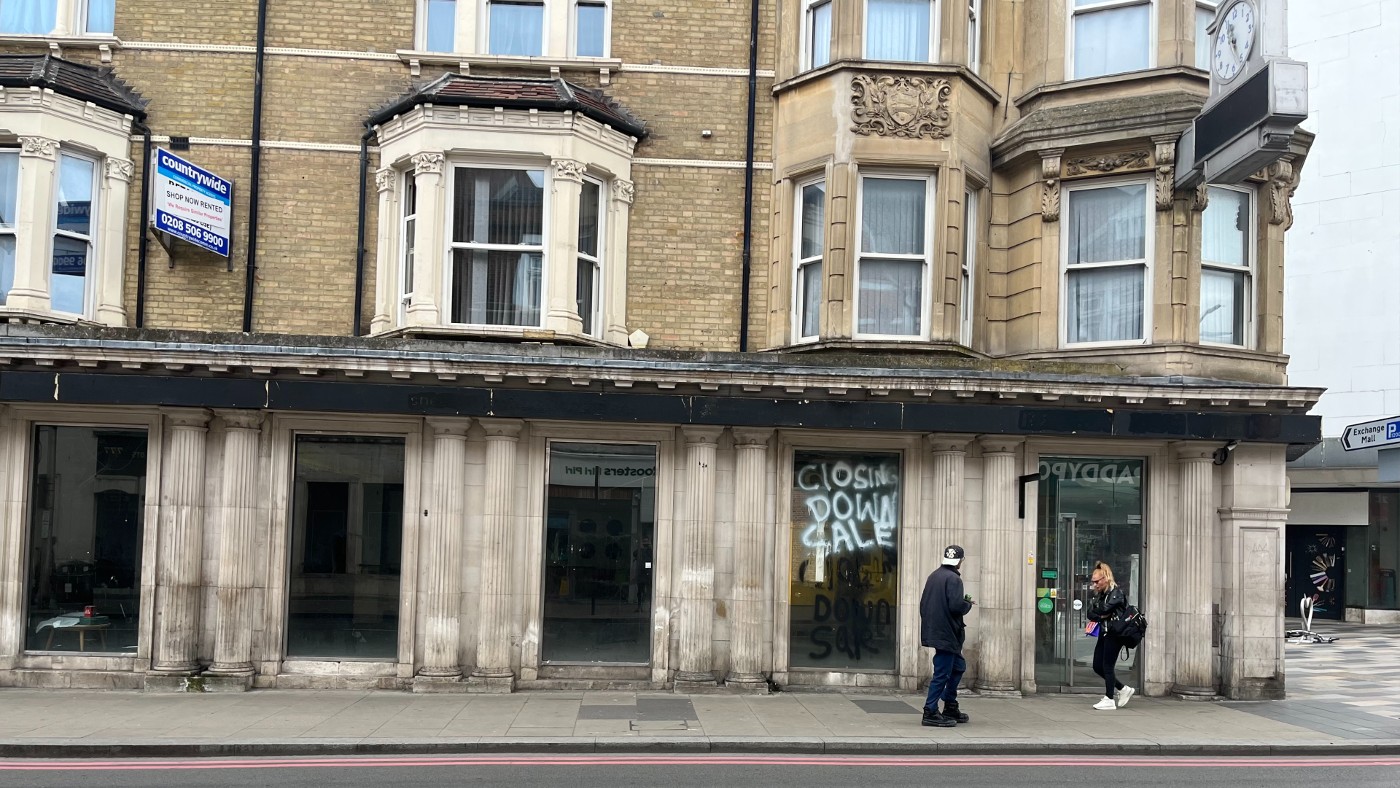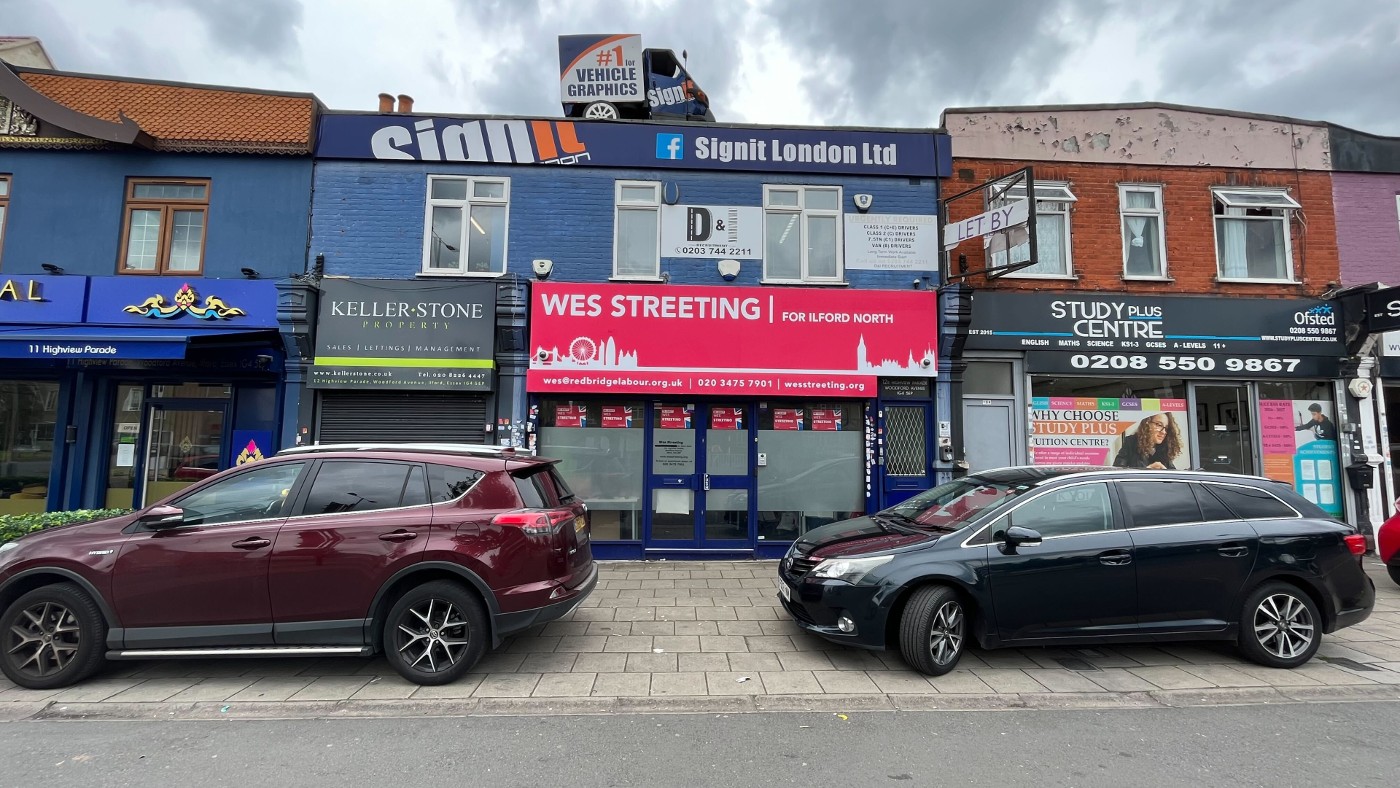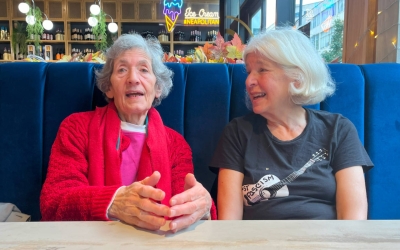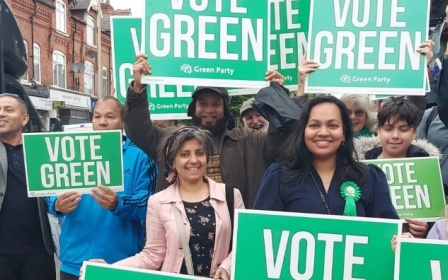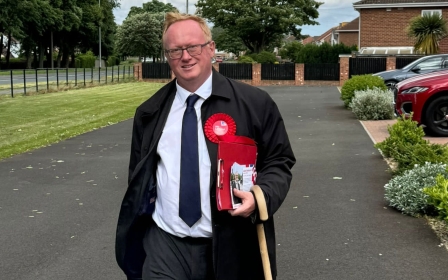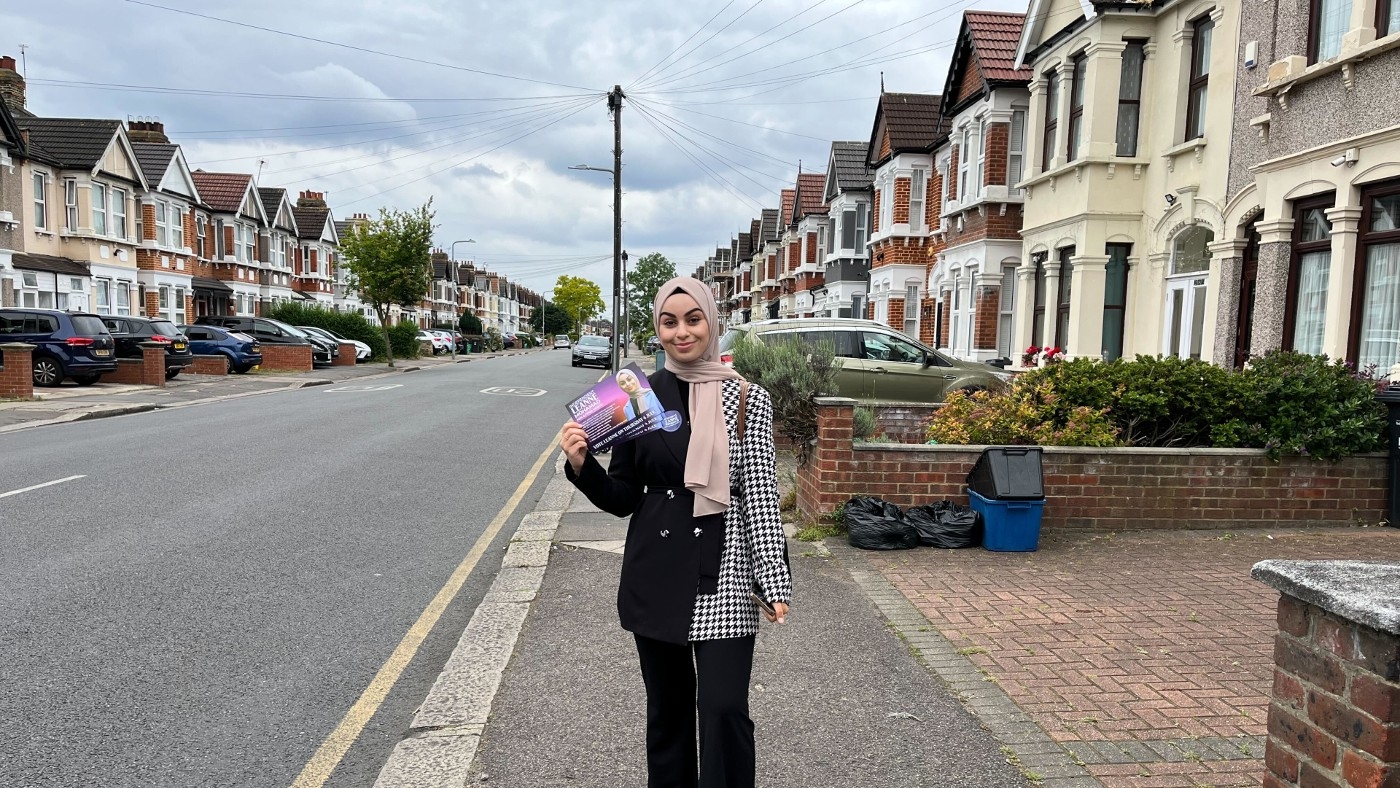
Leanne Mohamad: Could anger over Gaza topple a Labour heavyweight?
Driving along a street in Ilford, a few miles from where East London meets the county of Essex, a middle-aged Muslim man sticks his head out of the window and shouts, “Yes, yes, Leanne, go for it!”
Leanne Mohamad, 23 years old, raised here by Palestinian parents, smiles. She has been out on these streets every day since announcing that she is standing as an independent candidate in the UK's upcoming general election, and while the odds are stacked against her, she’s beginning to feel as though she might have a shot at winning.
Certainly, she’s becoming something of a local celebrity. On a canvassing session one afternoon and evening last week, people approached her in the street to offer support, ask how she was doing or take a selfie.
Alongside four other activists, she knocks on door after door. When the voters who answer don’t know who she is, she emphasises that she is an independent and tells them that the two main parties, Labour and the Conservatives, have failed them.
She speaks about her childhood and life in Ilford and how she will always represent the constituency of Ilford North as a local. The young human rights activist, who volunteered at her local mutual aid group throughout the Covid-19 pandemic, wears a hijab and a Palestine necklace as she moves from one door to the next.
New MEE newsletter: Jerusalem Dispatch
Sign up to get the latest insights and analysis on Israel-Palestine, alongside Turkey Unpacked and other MEE newsletters
Mohamad is one of a string of independent left-wing candidates - including former Labour leader Jeremy Corbyn and former Labour candidate Faiza Shaheen - who have put Israel’s war on Gaza at the centre of their campaigns.
'Labour has taken this stance to eradicate any support for Palestine and anyone on the left. Labour has let us down'
- Mo Misra, campaigning for Leanne Mohamad
This feels natural, given her family background. But Labour’s response to the crisis, with leader Keir Starmer saying after the Hamas-led attack of 7 October that Israel had "the right to defend herself” and the right to withhold power and water from Gaza has, Mohamad says, “woken up so many people”.
Canvassing for her in another part of the constituency, Mo Misra, who is in his 40s and participating in a political campaign for the first time, echoes Mohamad.
The war, which has seen over 37,000 Palestinians killed so far, and Labour’s response to it has galvanised him. “Labour has taken this stance to eradicate any support for Palestine and anyone on the left,” he tells MEE. “Labour has let us down.”
“If you are allowed to be critical of Russia, which is waging war in Ukraine, we should be able to criticise Israel as well,” he says. He feels a sense of pain, a sense of disbelief. He feels, too, that politicians such as Starmer have put Israel ahead of the British public.
“We have demonstrated peacefully and been called hate marchers. We haven’t been listened to. Jewish friends standing with us have been called self-hating Jews,” he says. “Starmer has let us down. What is this special relationship politicians have with Israel that they can’t have with their own people?”
'The Wesident'
Leanne Mohamad, a former Labour member before the war broke out, left the party and is now looking to defeat Wes Streeting, who has been the local MP for Ilford North since 2015. In the 2019 election, Streeting defeated the second-placed Tory candidate by 5,000 votes. Candidates from the Conservative Party, the Liberal Democrats, the Green Party and Reform UK are also contesting the seat.
Streeting, the Labour shadow health secretary, is a major figure on the right wing of the party and is thought of by many of its powerbrokers as a future prime minister. “Whatever it is that politicians need to have, he’s got it,” one Labour peer told MEE.
Streeting is a staunch supporter of Israel, with a parliamentary source saying that he regularly meets with the Labour Friends of Israel (LFI) lobby group inside Westminster. He was the first member of Labour's shadow cabinet to visit Israel after Starmer was elected leader, with LFI footing the £4,700 bill ($5,942). In February 2016, he visited Israel and the occupied West Bank, courtesy of Medical Aid for Palestinians.
The MP for Ilford has also received donations totalling at least £15,000 from Trevor Chinn, an 88-year-old Jewish former businessman and longstanding supporter of LFI and other pro-Israel causes, including LFI's Tory counterpart Conservative Friends of Israel.
Two officials who worked in the Labour government of former Prime Minister Tony Blair describe Chinn, who was brought in to advise them, as a "very strong supporter of Israel".
Since Israel's war on Gaza began following the Hamas-led attack of 7 October, Streeting has called South Africa’s case against Israel at the ICJ “a distraction” and has repeated Israel's claim that “Hamas uses buildings like schools and hospitals as bunkers".
The Labour MP has advocated for further privatisation within the NHS - writing in the Sun that those who complain about it are “middle-class lefties” (One Labour campaigner who knows Streeting and works in East London told MEE, "He welcomes the hatred of the left".) Streeting has also taken a recorded £179,900 from two donors with links to private healthcare: the billionaire hedge fund manager John Armitage and the millionaire “executive search” mogul Peter Hearn, who invested through his firm MPM Connect.
Streeting is also a working-class boy from East London. In his memoir One Boy, Two Bills and a Fry Up (the “two Bills” are his grandparents, one of them a flamboyant armed robber, one of them an upstanding Tory and, like Streeting, a practising Christian), he details the often-chaotic nature of his childhood in Stepney with separated parents and a slew of half-siblings. He describes taking a copy of Tony Blair’s New Britain: My Vision of a Young Country on the coach to games lessons.
He made it out of East London and got into Cambridge University, where he was able to come out as gay and was remembered by contemporaries as a student politician intent on emulating the machinations of the adult political world. He would brief student journalists and appeared to already be an effective operator. It was the first decade of the century, Blair was in power, and Streeting looked like he was training for a future in a Blairite Labour Party.
Elected president of the Cambridge University Students’ Union in 2004, Streeting became known as “the Wesident” (it’s unclear if he inaugurated the nickname himself). His predecessor, Paul Lewis - now a senior Guardian journalist - had been hailed as “boyband” handsome. When the university newspaper Varsity asked if his new role would bring him stardom, Streeting joked: “I don’t think there’ll be a cult of the Wesident.”
And yet, his memoir and his political trajectory since would suggest otherwise. Ending her review of the book, the Guardian’s Rachel Cooke wrote: “Will Streeting one day lead the party, perhaps even be prime minister? I don’t know. But I can’t see this book, and especially the way he has written it, as anything other than a statement of intent.”
'These politicians are all the same. They literally take us for fools'
- Newton, local resident
Back in Ilford, canvassing alongside Mohamad, 20-year-old Immanuel is particularly motivated by the Labour MP’s presence. “I just want to get rid of Wes Streeting,” he says. “He has terrible plans for the NHS.” Another canvasser, 22-year-old Callum from Ireland, says the same. “Streeting is a nasty piece of work. He’s only in it for his career.”
One voter, a white man in his 60s and a longtime Ilford resident, feels differently. He worries that a vote for Mohamad will inadvertently benefit the Tories, a party he wants to see the end of. He asked Mohamad why she was standing. As always, her response is quick and impassioned. “These parties aren’t representing us,” she said, adding, “Wes Streeting wants to privatise our NHS.”
Though he has advocated for the use of private healthcare to cut NHS waiting lists for treatment, Streeting has repeatedly denied the claim that he wants to privatise the NHS, saying last week on X, formerly Twitter: "Over my dead body would we privatise the NHS."
A Black man in his late 30s approaches with his young son, who has just finished his karate class and is still in the white uniform complete with a red belt. “Labour doesn’t represent us anymore,” Mohamad tells him. “That’s what I say. My wife votes Labour, though,” he replies. After a bit of prompting, he agrees to try and sway her. “I’ll try it this time.”
Newton, who is in his 60s and came to London from Jamaica in 1971, proves to be a particularly intriguing challenge for Mohamad. He tells her he has never voted in his life and that the only time he came close was “when I was a capitalist working in the city”, at which time he considered casting his ballot for Margaret Thatcher.
Since then, he has moved to the left but still doesn’t vote. He listens to LBC all day (and all night) long and spends half the year back in Jamaica. “There’s a religion in this country called corruption and it gets you,” he says. “These politicians are all the same. They literally take us for fools.”
“I will never be corrupted,” Mohamed tells him. “I’m running away from the dirt.”
She tells MEE she turned down an offer from George Galloway’s Workers Party of Britain to stand as their candidate and got them not to stand against her. She says the Green Party is not campaigning actively for its candidate, Rachel Collinson, in Ilford North, giving Mohamad a better chance against Streeting and Tory candidate Kaz Rizvi, a doctor and councillor in Epping Forest.
Life on the high street
The constituency they are trying to win is multicultural, with about a quarter of the population being Muslim, but also reflects what so many places in the country look like after 14 years of Tory rule, during which funding to local councils has been cut by 40 percent and resources for public services decimated.
On Cranbrook Road, the high street trailing north from Ilford station, betting shops, pound stores and 24-hour slot machine arcades sit next to empty units and the odd chain store. All the betting shops have Streeting as the overwhelming favourite to win in July.
For at least four months after Israel’s war on Gaza began, there were Palestinian flags hung here and there as well as posters calling out Streeting for his stance on Gaza. The flags, and the posters, are now gone.
Inside its office, Community Action Redbridge, which works with charities and the council in the local community, is at pains to point out that it is apolitical, unlike the very similarly named Redbridge Community Action Group, which had been supporting Leanne Mohamad.
Still, it is clear that Community Action Redbridge is finding its work harder and harder, with inequality widening and economic and mental health crises worsening. There is less money and more problems.
Along the high street, business owners tell the same story: everything is more expensive, customers have less money and shoplifting is rampant.
Inside one of the slot machine arcades, four or five punters put their coins in, hoping for a return. The place smelled vaguely of alcohol. It was 10.30am. “When’s the election, 4 July?” asked Brenda, working the counter. “I’m on holiday then.”
“Nothing changes,” she says. “They’re all the same. They don’t do anything for us, for working-class people. It’s got worse for all of us.” She didn’t know who any of the candidates in Ilford North were.
A few minutes down the street, MEE found a Labour voter outside The Great Spoon of Ilford, the local Weatherspoon’s pub. Michael left England as a young man to go to Australia, where he found success as a mechanic and eventually set up his own business.
'I came to Ilford in 1984 when I was a child. It was peaceful then... Now, it's like the Wild West. I don't know how it's going to be fixed'
- Ajay, local resident
But he never got Australian citizenship, so when he was convicted of manslaughter, he was sentenced to eight years in prison, followed by 18 months in a detention centre on Christmas Island, which he described as worse than prison. Despite mounting an expensive legal battle, he was deported back to the UK.
The Australian government sent him to Ilford with a voucher, and the local council are now paying for him to stay in a privately rented room. He lives off disability benefits, hates Britain and thinks it’s “run by Muslims”. He doesn’t know who Streeting is, but he is voting for Labour because that is what he has always done.
Further north into the constituency, Valentines Park contains a mansion built at the end of the 17th century, a boating lake, a cricket pitch, tennis courts and a cafe, where almost a dozen local voters told MEE they had lost their faith in politics and politicians. Many of them could not name the local candidates.
“I came to Ilford with my family in 1984 when I was a child,” Ajay said. “It was peaceful then. It wasn’t perfect, but it was peaceful. Now, it’s like the Wild West. I don’t know how it’s going to be fixed.”
Cranbrook Road leads to Gants Hill, where the Jewish deli Shalom Hot Bagels Bakery, founded by Amnon Shalom in 1986, sits on a busy roundabout just a few minutes' walk from Streeting’s office.
After the Second World War, many Jews came to the East End of London before migrating further east to Ilford. By 1970, the community numbered some 30,000, but by the turn of the century, that was changing as Jews moved to more affluent areas in the city’s northeast and northwest fringes.
On Sundays, Shalom’s is still busy, and during the week, its customers come from a wide range of backgrounds - Jewish, Muslim, East African, and more. There’s a mosque opposite it, next to a Sri Lankan-run shop and not far away is a fish and chip shop with a large Union Jack flag out the front.
This is, in short, multicultural London. There is a feeling, though, that once it is gone, the Jewish delis of Ilford and Gants Hill, which were once thriving businesses, will be gone.
At Streeting’s office up the road, the blinds are drawn. A “Free Palestine” sticker has been ripped off the doorbell. MEE rings it and is told to call the office number. When the office is called, a staff member says MEE should email, but the campaign has yet to reply.
Canvassing in Barkingside just after the election campaign began, Streeting posted on Instagram that he was “standing on my record - from saving King George A&E to helping thousands of residents every year”.
Back on the trail with Leanne Mohamad, a former local union representative for Ford, comes over to talk. Mohammed is voting for the British Palestinian candidate, but he’s worried the “older generation” is stuck in its Labour-voting ways and he wants to know how she’s going to reach them.
Mohamad tells him that she is going to speak at the local mosque, located on the appropriately named Balfour Road. The mosque can’t endorse a candidate, but it will help her spread her message, particularly on a Friday when up to 2,000 people can attend prayers.
After Mohamad moves on, Mohammed, who has been involved in politics in Ilford for much of his life, explains what he meant.
“The older generation has got this mindset stuck in their heads,” he says. The men and women who came to Ilford from Pakistan and Bangladesh in the 1970s “still believe that Labour is good for them”.
Back then, he says, “They thought it was easier to get to Britain under Labour and that Labour meant better benefits… Many of them don’t speak English and they don’t know what the parties stand for now. Palestine is the only thing that might change their minds.”
It starts to rain. Mohamad and her team pose in front of a house that has a Palestinian flag flying from the chimney. Iman, 19, tells MEE that when she came across Mohamad, she thought it was “inspiring to see a young hijabi girl doing it”.
When Mohamad was just 15, she faced a barrage of online abuse after winning a competition for delivering a speech defending Palestinian rights. She was accused of “vicious blood libels against the state of Israel” by pro-Israel trolls. Streeting came to her defence in a Facebook post. Now, the teenager he defended is campaigning to unseat him.
“It’s super strange, but it’s a duty,” Mohamad says when asked what it feels like to be running for parliament. “If we lose, well then at least we tried. If not now, then when?”
Middle East Eye delivers independent and unrivalled coverage and analysis of the Middle East, North Africa and beyond. To learn more about republishing this content and the associated fees, please fill out this form. More about MEE can be found here.


